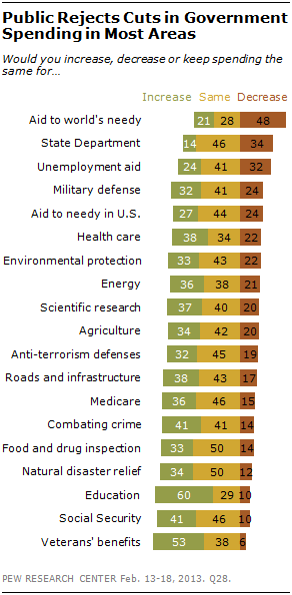Are Americans really anti-government? Based on the progress of the 2016 campaign, it doesn’t seem like it. Neither Donald Trump nor Ted Cruz are succeeding because of anti-government attacks.
Look at Trump’s successful message. He stands for bigoted authoritarianism. He wants to use government, forcefully, against the groups of people he hates. Trump wants the government to build a gigantic wall between the U.S. and Mexico, deport 12 million residents, torture people suspected of terrorism and kill their wives and children. At the same time he wants the government to give him, and the rest of the ultra-rich, larger tax breaks.
And look at Ted Cruz. He likes to say he’s against government but he’s winning primaries by riding a wave of white evangelicalism. These voters support him because Cruz wants to (or they think he wants to) use government to outlaw same-sex marriage, discriminate against LGBT citizens, suppress mosques and Muslim beliefs, teach creationism and other fundamentalist Christian religious ideas in public schools, abolish abortion, limit birth control, and require abstinence-only sex education.
Among voters there’s anger aplenty, but it’s not much directed against government. Why?
While it’s true that Americans think government is—in a general way—too corrupt, too partisan and too wasteful, a good part of that thinking is based on the understanding that wealthy individuals and huge corporations have corrupted the system to benefit the rich over the rest of us. The crude “government is the problem” doesn’t accurately capture what Americans—even today’s conservatives—are thinking. In fact, when it comes to specific policies, people want more government, not less.
For example, this poll asks if Americans would increase, decrease, or keep spending the same amount for a variety of government programs.

There’s not a single subject where most people would decrease spending! This is the brutal truth about the anti-government story: Americans say they don’t like government in theory but like it very much in practice.
Even when it comes to government “rules” and “regulations,” Americans overwhelmingly favor them—64 percent are favorable and 21 percent unfavorable to government “rules,” and 58 percent are favorable and 29 percent unfavorable to “regulations.” [This and the polling below are from Lake Research Partners.]
In fact, when asked whether “increased enforcement of the nation’s laws and regulations is a good thing,” The results were:
………………………….Good Bad
All Voters 71 14
Democrats 79 10
Independents 73 8
Republicans 63 19
The numbers are even stronger at the state level. When asked whether “increased enforcement of state laws and regulations is a good thing,” Americans responded:
…………………………..Good Bad
All Voters 74 10
Democrats 70 12
Independents 79 10
Republicans 75 9
Here’s one final piece of evidence. A progressive, pro-government narrative was tested against a conservative one.
Progressive message: (Some people say/Other people say) proper enforcement of our laws and regulations can ensure that everyone plays by the same set of rules. Today, the system is too often rigged to favor the wealthy and powerful over ordinary Americans, or big corporations over small businesses. That’s an argument for better enforcement. Whether prohibiting big banks from destroying our economy, stopping the credit card industry from charging hidden fees, or preventing the wealthiest 1% from hiding billions of tax dollars in offshore tax havens—we need stronger, more just enforcement of our laws and regulations to ensure that everyone has a fair shot.
Conservative message: (Some people say/Other people say) protecting consumers is important but government regulation has gone too far, so that some politicians seem to think government is the answer to every problem. Increased regulation, bureaucratic red tape, mandates, and uneven enforcement hold back economic growth and destroy jobs. America was built on the free market and free enterprise. Forcing entrepreneurs, small business owners, and citizens to submit to arbitrary government regulations puts all the power in the hands of out-of-touch bureaucrats. It raises the costs of goods and services at a time when we can’t afford higher prices.
The result? 80 percent of Americans chose the progressive message. There is no uprising against an out-of-control government.
(We will present much more about this Lake Research poll and this topic at a May 18 webinar.)